(This four-part article describes the legacy of the Snow Valley Basketball School on coach development and the game of basketball)
————
In a hurry, Herb Livsey drove towards Rancho Santa Fe, California. The opportunity to secure a well-known teacher of basketball within his grasp. Pete Newell’s grandson had just enrolled in the Snow Valley Basketball School. Enshrined in the Naismith Memorial Basketball Hall of Fame, Coach Newell is one of only three coaches to win the National Invitation Tournament (NIT), a NCAA championship, and an Olympic Gold Medal (The Naismith Memorial…, 2018). In 1987, The Atlanta Tip Off club awarded him the Naismith Outstanding Contributor to Men’s Basketball Award (Citizen Naismith Trophy, 2018).
Livsey had known Coach Newell for a number of years. “One of my goals was to get Pete Newell to come and teach defense at Snow Valley,” recalls Livsey, “… because he (Newell) is a defensive guru.” Livsey seized the moment. He arrived at Pete Newell’s house and recalls the following exchange.
“Pete, how would you like to coach your grandson,” asks Herb?
“How can I do that,” responds Newell?
“He just enrolled at the Snow Valley basketball School,” says Herb. “You want to come and be the coach of that division where your grandson is?”
“Sold,” exclaimed Newell.
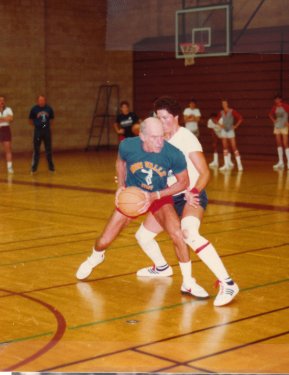
Jack Ramsey teaching at Snow Valley. Photo credit: Steve Middleton
Celebrity Coaches
Over the years Livsey coaxed well-known coaches to spend a week in Santa Barbara, California. In addition to Newell, the list includes Pete Carril, Jud Heathcote, Tim Grgurich, Bill Musselman, Lute Olson, Jack Ramsey, Bill Sharman, and many more. Landing Pete Newell to run the defense for a week of camp demonstrated Livsey’s drive to get the top coaches: A memory he shares with pride. But another memory also sparks satisfaction. Livsey wanted to bring the Van Gundy family to teach defense across all three divisions (Central, 5thto 8thgrade; Eastern, 9thand 10thgrade; Western, 11thand 12thgrade).
The Van Gundy name is woven throughout basketball history. Bill Van Gundy spent over 40 years as a small college basketball coach. In 2005, for his commitment to the game he was honored by the National Association of Basketball Coaches (NABC) with the Guardian of the Game Award (NABC, 2018). His two sons Jeff and Stan both became NBA head coaches. Between 1995 and 2007, Jeff spent seven seasons leading the New York Knicks and four seasons leading the Houston Rockets. He has served as an NBA Analyst for ESPN since 2007 (USA Basketball, 2018). Stan Van Gundy had three head coaching stints in the NBA with the Miami Heat (2003-06), Orlando Magic (2007-12), and the Detroit Pistons (2014-18) (Basketball Reference, 2018).
The Van Gundy connection to Snow Valley dates back to when Jeff and Stan attended the camp as players. Bill served as a camp coach, keeping a watchful eye on his two young sons. Livsey recalls the moment he decided to bring all three Van Gundy’s in for one week. “I told my wife one day, here is what my goal is,” says Livsey. “Instead of hiring a main coach for the Central Division and lesser known coaches for the Eastern and Western Division. I am going to try and get the Van Gundy’s to come, with Jeff taking the oldest players, Stan taking the middle players and Bill, the Dad, taking the Central Division. That way I would have consistency across the three divisions.” Livsey met his goal. The Van Gundy’s came for a week.
In retrospect it may appear that Livsey sought “big names” when hiring lead clinicians. There is some truth to this. But Livsey’s motivation was always driven by finding the best teachers of the game to run the instructional clinics. For every Pete Newell and Van Gundy, many more coaches cut their teeth at Snow Valley before garnering national recognition.
Prior to being named the head coach of the Los Angeles Lakers in 1981, Pat Riley was one of the first professional players to teach at Snow Valley. An All-American player at the University of Kentucky under the legendary Adolph Rupp, Riley led an instructional clinic and shared Rupp’s Guard Around Offense Series. Although not yet a coach, Riley had a knack for teaching and left an impression on Livsey. It’s a moment he still remembers well. “He created an outstanding learning environment during his clinic,” remembers Livsey. “It was a great presentation.”
Riley went on to lead the Lakers to four NBA titles in the 1980’s. He won a 5th with the Miami Heat in 2006. Other notable coaches who developed following their experience at Snow Valley included: Dan Hays, who amassed 724 career wins as the head men’s basketball coach at Oklahoma Christian; the late Don Meyer, currently the eighth all-time winningest college men’s basketball coach with 923 career wins; and Tony Harper, one of the winningest high school coaches in Texas with over 1,000 victories. The list goes on.
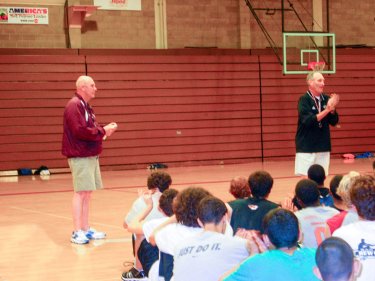
Don Meyer (left) and Dan Hays (right) at Snow Valley. Photo credit: Steve Middleton
Many coaches still work the sidelines. Current Loyola Marymount University head coach, Mike Dunlap won two national championships at NCAA Division II Metro State and spent time as an NBA head coach. Steve Middleton remembers when Pete Newell and Mike Dunlap ran an instructional clinic together. “Pete was in his early 80’s and he was teaching the middle school division, and Mike Dunlap was Pete’s assistant because Pete could not move around really well,” recalls Middleton. “Here is a guy (Dunlap) who won two national championships at the division two level and here is a guy (Newell) who some have referred to as the “Pope of Basketball” in front of these kids.”
Snow Valley became a setting where coaches that cared about teaching the game could converse with each other. A coach would absorb the teaching methods taught at Snow Valley, then implement the concepts in their own program. With an emphasis on improving teaching practice, new basketball ideas advanced.
New Drills for Skills
At 81 years of age, Coach Tates Locke continues to speak at coaching clinics entertaining audiences with his gruff ‘old school’ ire, mixed with a sense of humility and humor. The long-time Snow Valley Coach has deep roots in the game of basketball. It’s a story that includes the hiring of Bob Knight as his assistant coach; a rise to the top of college coaching; an ungraceful exit amid NCAA violations; redemption when hired to revive a struggling program (Rhoden, 1989); and contributions to the game through lessons shared with younger coaches. Locke’s influence on teaching basketball is a series of drills designed to practice the proper footwork associated with the offensive skills of basketball. The drills are called Box Drills. Box Drills originated at Snow Valley, where Locke refined the best approach to teach the drills.
Charlie Sands was a natural fit at Snow Valley and he left his permanent mark on camp history in more ways than one. Beyond his knack for inspiring campers during daily warm-up sessions, his teaching style focused on the fundamental skills of basketball. Coach Sands’ lasting legacy in teaching basketball is the Oiler Drills. Titled after the nickname of his team at West Los Angeles College, Oiler Drills are conditioning and shooting drills that pushes players to practice at game speed.
While Livsey provided a setting for coaches to advance the teaching of basketball skills through Snow Valley, he made his own direct contributions. Livsey’s friendship with Mark Grabow was well-established: A friendship initiated by Herb after he observed Mark teaching individual skill development in Flagstaff Arizona in 1987. Grabow would spend a couple days at Snow Valley each summer working with the campers. His status elevated due to his role with the Golden State Warriors. He worked out the pros including NBA greats like Chris Mullin, Mitch Richmond and Tim Hardaway.
Influenced by Grabow’s work and with his permission, Livsey created a notebook titled Warrior Drills. Named appropriately for Mark’s role with the Golden State Warriors, the notebook contains 50 pages of drills designed to improve a player’s footwork relative to shooting.
The teaching of Box Drills, Oiler Drills, and Warrior Drills today occurs at every level of basketball in gymnasiums all over the world. Any drill or teaching method developed at Snow Valley was refined through discussions with other coaches at the camp. Coaches working the camp would learn the drills and then share them in their own communities. The more connected the coach was, the greater their influence in spreading and promoting the new way of teaching a skill.
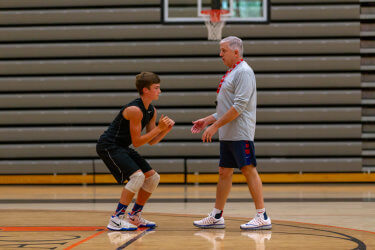
Don Showalter leading instruction at Snow Valley. Photo credit: MD Janiska (https://www.instagram.com/md_janiska/)
A Coach From the Heartland
In 1974 an enthusiastic young coach from Iowa named Don Showalter, eager to see where the sport of basketball could take him, penned a letter to Coach Wooden asking to work as a counselor at one his camps. Showalter remembers being surprised to receive a handwritten letter in the mail from Coach Wooden. Showalter recalls that Wooden’s letter said, “Thank you for your interest. I turned your information over to the guy that runs the camps. If something opens up, I am sure he will be in touch.” That summer when a camp counselor fell ill at the last minute, Showalter received a phone call. For the next 25 years, Don spent his summers working the John Wooden Basketball Camp.
Showalter credits the letter to Coach Wooden in setting his career path. A journey spanning 42 years as a high school basketball coach in Iowa, where he amassed over 600 wins and was inducted into the Iowa High School Athletic Association (IHSAA) Hall of Fame. In addition, he has served over the past 10 years as the head coach of USA Men’s Basketball U16 and U17 Junior National team. His teams have gone undefeated (62-0) and earned ten-straight gold medals.
Along the way, Showalter grew his network of coaching colleagues. Many of the coaches he met at the John Wooden Camps would impact his personal and professional life. One coach was Wayne Carlson. “Don and I worked the John Wooden camp together in the late 70’s and I told Herb, I worked with this great coach from Iowa,” says Carlson. “I would talk to Don and say you need to come out and work Snow Valley, it is totally different than the Wooden camp. I mean you are not around John Wooden everyday – but it’s a great teaching camp.” Showalter did not need much persuading.
Don Showalter built a coaching career on his ability to teach the fundamentals of basketball and make connections with those in the game: Both of which were nurtured at Snow Valley. He shared the same passion for teaching basketball as Herb Livsey and he would play a key role in carrying on Snow Valley legacy. Showalter also help spread some of the teaching ideas developed at Snow Valley. One was Cutthroat.
Cutthroat
Cutthroat is a 4 on 4 live scrimmage situation involving four offensive and four defensive players. Coaches can modify the rules to adapt the game to their coaching philosophy. For example, each of the four offensive players must touch the ball before a player can shoot, a player must recognize a good pass from one of their teammates when they score, or an offensive player can only take two dribbles.
Cutthroat can be used to develop both offensive and defensive skills. However it originated as a method to teach defense in 1975 when Livsey asked Dick Motta of the Chicago Bulls to teach the defense at Snow Valley. Coach Motta spent 25 seasons as an NBA head coach. In 1971 he was named NBA Coach of the Year and in 1978 won an NBA Championship with the Washington Bullets. He ranks among the all-time leaders in NBA games won and number of games coached (NBCA, 2018). “He (Motta) says to me, ‘I could teach defense any way you want. But when I coach, I teach it through Cutthroat. I call it Cutthroat,’” said Livsey. “I set it up and we ran Cutthroat the first night and Snow Valley adopted Cutthroat as the center piece of the defense.” Cutthroat continues to be a central part of a Snow Valley basketball camp. Today, coaches implement Cutthroat at all levels of play from youth leagues to the NBA.
Showalter embraced cutthroat as a teaching tool and a method of helping players come together as a team. He first implemented the game with his high school team and then with the USA Junior National Team. “Kids love it. We are talking high level types of players really buying into cutthroat. It is fun but at the same time really intense,” says Showalter. “We were teaching a lot of things with it. It evolved (from Snow Valley) to our national team.”
Showalter’s success with the USA Junior National Team is credited to his ability to communicate with elite athletes and build an effective team culture. Livsey once asked Showalter how he got the young stars, the elite U16-U17 athletes on the Junior National Team, to play together. “He looks me in the eye,” Livsey recalls, “and says, Cutthroat.”
Cutthroat, like the Box Drills, Oiler Drills, and Warrior Drills were cutting edge techniques that kept coaches coming back to Snow Valley each year. In addition, coaches recognized the value of making connections with other coaches at Snow Valley in regard to career advancement.
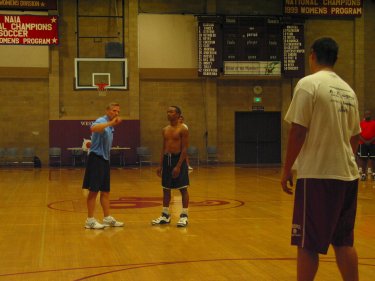
Mike Dunlap teaching at Snow Valley. Photo credit: Steve Middleton
It’s Who You Know…
Beyond improving teaching competence, Snow Valley served as place a coach could meet the right person and maybe secure a job. “If someone was looking for an assistant, they might say, ‘Hey, go call Herb,’” remembers Steve Middleton. “That was the reason a lot of guys would come work the camp in the early days. There are so many guys that owe their job to Herb Livsey and Snow Valley.”
Richard Fujii felt the impact of Herb’s influence in securing an assistant coaching position at Menlo College (CA). One summer at Snow Valley, Fujii served as a basket coach during a post clinic led by Kaniela Aiona. Aiona and Fujii had a conversation, but that was the extent of their interaction. A few years later Aiona became the Head Men’s Basketball Coach at Menlo College. After his first season, Aiona had an assistant coaching position open. Because Fujii had met Aiona at Snow Valley he reached out to Aiona to inquire about the opportunity. Unknown to Fujii, Livsey was a mentor to Aiona.
Around the same time, Livsey and Fujii were both attending a wedding for a Snow Valley coach. Serving as a groomsman, Fujii spoke about how he met the groom at Snow Valley and the passion they both had for the camp. Following the speech Livsey approached Fujii. Chuckling at the memory Fujii recalls Livsey saying, “Fujii I have been at a lot of weddings and this is the first time Snow Valley has been mentioned in a wedding.” The conversation continued and Fujii shared that he had been in contact with the head coach at Menlo College about an opening on his staff. Fujii remembers Livsey’s response, “Herb says, ‘oh yeah, Kaniela is up there. I mentored him,’” says Fujii. “Herb makes a phone call and two days later I get a call from Kaniela.”
Outside of Livsey’s direct influence on career advancement, the camaraderie shared among Snow Valley coaches opened potential career pathways. To work a Snow Valley camp was a shared experience, an initiation into the Snow Valley coaching fraternity. Steve Middleton reflected on his experience – stating, “when you worked Snow Valley, at the end of the week you were exhausted. Coaches having gone through that together, hold that…‘we were worked to the bone’ to our hearts.”
Pete Gaskill remembers his induction into the Snow Valley coaching fraternity. “At first I was the new guy, then I was the guy from Iowa, and then I was the guy from Kansas City, and then I was Pete Gaskill,” shared Pete. “They (coaches at Snow Valley) look out for you. I had so many people look out for me. So anytime I go out there I try to make sure I help others the same way.”
A network was established. Over the years, a Snow Valley coach would hire coaches they worked with or take recommendations from other Snow Valley coaches they knew. Coaches had access to knowledge, job opportunities, and more importantly they became a part of each other’s lives. An extended family.
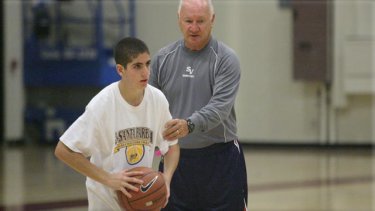
Charlie Sands leading instruction. Photo Credit: US Sports Camps.
The Snow Valley Family
Summer vacation for the Carlson family included a three week stay at Westmont College. They lived in the dormitories. The kids attended camp. Wayne’s spouse assisted in the camp office. “For me it was a family thing – going up there for 3 weeks during the summer for 34 years,” Wayne reminisces. “The support was amazing. You had guys you would get together with as the years went on who you’d talk with and share things.”
Clete Adelman echoed Carlson’s sentiment. “The life-long friends that you make continue your education,” shared Clete. “I could not have stayed in coaching if it was not for Snow Valley. I don’t think I would have been nearly as effective.” As the fraternity continued to grow, connections between coaches included their families. Especially when coaches worked together year after year. Which was the case with Clete Adelman and Charlie Sands.
Ten year-old Ben Adelman started following his father to Snow Valley. Eventually, working as a counselor and then a coach. Due to his Dad’s role as a camp administrator and the amount of time he spent at camp, Ben became close to Charlie Sands and was a recipient of many of his life lessons. Often the lessons positioned around being a good teammate. Clete Adelman fondly recalls one of Sands’ lessons about being a positive contributor to the team. “One of his (Sands) comments was, don’t be that guy. Don’t be the guy who is the negative part of the team. Who is not contributing anything unless you are involved,” remembers Adelman. “Sometimes Sands would look at the kids and he would say, ‘Are you that guy?’ The kids would look at him and the kids would get it.”
In 2001 Livsey stepped away from Snow Valley after 41 years, selling his ownership rights to US Sports Camps. Sands already a part owner retained his rights. Together, with the assistance of Adelman, Carlson, and Middleton they kept “The Snow Valley Way” intact. But in 2015, Charlie Sands was no longer himself. Ill from the effects of corticobasal degeneration(CBD), a rare progressive neurological disorder that leads to cell loss and deterioration of specific areas of the brain, Sands could no longer coach at Snow Valley.
Realizing Sands’ decline was happening swiftly, Ben Adelman found an old picture of Charlie Sands doing push-ups in front of the campers. In honor of Coach Sands, Ben had t-shirts made with the picture and the phrase, Be this Guy! “Charlie was special…,” Clete stated, trailing off – emotional at the thought of his friend. “He (Ben) just loved Snow Valley and Ben loved Charlie.”
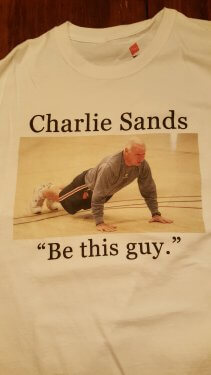
Ben Adelman’s T-Shirt of Charlie Sands. Photo credit: Clete Adelman
“When we took the t-shirts back to the camp, the guys just went nuts,” says Clete. “We gave them to his family. But then there was such a demand for them that we had to order some more.”
Although Charlie was unable to work camp, he attended all week. The camp staff organized a luncheon as a tribute to the esteemed coach. As the story goes, Ben assists Coach Sands as they amble towards the cafeteria. At one point Ben reveals he is wearing the t-shirt. Sands, not one to hold back his feelings, shares a personal, emotional minute with Ben. A powerful moment only to be matched by what awaited them in the cafeteria. As Charlie and Ben enter the lunchroom, the entire camp staff stands up. Clad in the t-shirt Ben made, many in tears, they saluted Charlie.
Sands passed away in 2016, leaving behind the legacy of a teacher who truly cared. To those that knew him, Sands epitomized a Snow Valley coach. A coach that set a higher standard, was open to learning, and always strived to make a difference. A person willing to give and receive in a supportive community.
By the early 1990’s the Snow Valley name echoed throughout the basketball landscape. A basketball school had changed the game and connected hundreds of coaches. Charmed by the Snow Valley Way of teaching and connections he made, Don Showalter and his good coaching friend from Iowa, Jerry Slykhuis, were ready to help grow the Snow Valley Way.
In the next article (Part IV): Where Coaches Go to Love the Game Again. How Snow Valley became a supportive community for coaches and how the legacy of Snow Valley continues today. Read Part I here and Part II here.
References
Basketball reference (2018). Stan Van Gundy. Retrieved from https://www.basketball-reference.com/coaches/vangust99c.html
Citizen Naismith Trophy (2018). Past award winners. Retrieved from http://naismithtrophy.com/awards/
NABC (2018). NABC Guardians of the game awards. Retrieved from: http://www.nabc.com/awards/guardians_of_the_game
Naismith Memorial Basketball Hall of Fame (2018). Peter F. “Pete” Newell. Retrieved from: http://www.hoophall.com/hall-of-famers/pete-newell/
NBCA (2018). Dick Motta consideration into Naismith Basketball Hall of Fame. Retrieved from: https://nbacoaches.com/dick-motta/
Rhoden, W. C. (1989, November 8). A new leaf for Tates Locke; Indiana State hopes he’ll revivify the basketball program. New York Times. Retrieved from: https://www.nytimes.com/1989/11/08/sports/new-leaf-for-tates-locke-indiana-state-hopes-he-ll-revivify-basketball-program.html
USA Basketball (2018). Jeff Van Gundy. Retrieved from: https://www.usab.com/basketball/staff/v/van-gundy-jeff.aspx

Another great article, I remember working with Don Meyer and many others those weeks.
Thank you for reading! So many coaches influenced by other coaches Snow Valley. Thanks for sharing.
I met Herb Livsey at a Coaches Clinics in Anaheim,Ca. I was named the Head Coach at Westminster College , SLC< Utah. I went to the cliinic to meet coaches so I could recruit players from Californian
Being from the DC area and my first Head job at 27 I did not know anyone on the West Coast. At the clinic I met Herb who was a Junior College Coach. Our relationship has continued to the present day
I like to think God shined over my head meeting Herb. Latter I was the Personnel Director for the
Clippers Herb invited me to speak at Snow valley . Herb knew I had organized the Adrian Dantley Camp and asked me to speak on one on one offensive moves. Being able to speak at the Snow Valley camp was a thrill. Knowing the great coaches that spoke there was one of the highlights of my coaching career which has now been over 40 plus years. I would see Herb on the road when I was scouting players and we would talk basketball. He been a great friend and he is always had time to help me.
Herbs friend Chuck Walker and I coached against each other when Chuck was at Ft. Lewis and I would tell Herb how everybody in the gym would be hear Chuck yelling HANDS, HANDS, HANDS
I have been blessed to meet so many of the coaches you mention in this article.
Thank you for reading and sharing your connection to Herb Livsey and the Snow Valley Basketball School.
The Snow Valley guys, led by Coach Livsey, ran ‘Snow Valley North’ in Sitka, Alaska for nine years. He brought trusted staff and ran the camp just like SoCal over the four day Labor Day weekend. About 1000 kids benefitted from Coach Livsey who never would have had the chance in rural Alaska to get coaching at the highest level. It created a bond for life.
Thank you for sharing your connection to Snow Valley and reading! Livsey’s work in Alaska is mentioned in Part 4.
I was a high school coach at Palm Desert HS in California when I first heard Herb Livsey speak at a basketball clinic. I was enthralled with the passion this man possessed for the teaching of the game and went up to him after the clinic and spoke to him. Among other basketball related things we spoke about was that I was interested in getting better as a coach and he told me about Snow Valley. Little did I know that Herb always checked on the credibility of anyone coaching there and it wasn’t until months later that I received an invitation to coach there. I was thrilled on passing his initial test and in 1993 went to coach at my first Snow Valley School and was in awe of the amazing instruction I witnessed there. Herb, Charlie, and Clete were awesome teachers and I spent the next 22 years coming back to Snow Valley to teach. I became friends with Wayne and Steve and just kept coming back each summer.
When I decided to retire from the desert and join my son as a JC assistant in the Seattle area I spent my last year there, and it was memorable for I was the defensive clinician with coach Harper from El Paso. Both of my sons attended Snow Valley and what they received there was invaluable for both of them. I am still coaching with my son Donald at Bellevue College and he uses cutthroat and many of the coaching techniques he learned at Snow Valley. I will forever be grateful for the chance Herb Livsey gave to me to coach at Snow Valley as it was the single most important step I, along with so many others, took to keep learning in now my 45th year of coaching.
Thank you for sharing your story, Coach Brady!